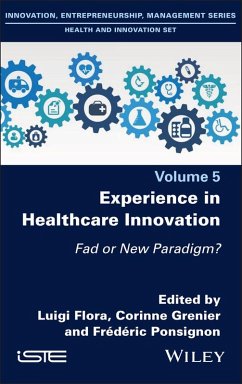Experience in Healthcare Innovation (eBook, ePUB)
Fad or New Paradigm?
Redaktion: Flora, Luigi; Ponsignon, Frederic; Grenier, Corinne
126,99 €
126,99 €
inkl. MwSt.
Sofort per Download lieferbar

0 °P sammeln
126,99 €
Als Download kaufen

126,99 €
inkl. MwSt.
Sofort per Download lieferbar

0 °P sammeln
Jetzt verschenken
Alle Infos zum eBook verschenken
126,99 €
inkl. MwSt.
Sofort per Download lieferbar
Alle Infos zum eBook verschenken

0 °P sammeln
Experience in Healthcare Innovation (eBook, ePUB)
Fad or New Paradigm?
Redaktion: Flora, Luigi; Ponsignon, Frederic; Grenier, Corinne
- Format: ePub
- Merkliste
- Auf die Merkliste
- Bewerten Bewerten
- Teilen
- Produkt teilen
- Produkterinnerung
- Produkterinnerung

Bitte loggen Sie sich zunächst in Ihr Kundenkonto ein oder registrieren Sie sich bei
bücher.de, um das eBook-Abo tolino select nutzen zu können.
Hier können Sie sich einloggen
Hier können Sie sich einloggen
Sie sind bereits eingeloggt. Klicken Sie auf 2. tolino select Abo, um fortzufahren.

Bitte loggen Sie sich zunächst in Ihr Kundenkonto ein oder registrieren Sie sich bei bücher.de, um das eBook-Abo tolino select nutzen zu können.
Using the experience of patients, users, healthcare professionals and other stakeholders to innovate and rethink healthcare organizations and systems is gaining ground. Deploying these innovative methods and practices, however, requires an understanding and mastery of theoretical principles, as well as experimenting with them in the field.
Experience in Healthcare Innovation alternates between theoretical presentations and case studies/examples in order to present the key notions of innovation in healthcare and the experiences of the people at the heart of healthcare ecosystems. It brings…mehr
- Geräte: eReader
- ohne Kopierschutz
- eBook Hilfe
- Größe: 6.82MB
Andere Kunden interessierten sich auch für
![Shopify Dropshipping Guide (eBook, ePUB) Shopify Dropshipping Guide (eBook, ePUB)]() Marcus RogersShopify Dropshipping Guide (eBook, ePUB)2,99 €
Marcus RogersShopify Dropshipping Guide (eBook, ePUB)2,99 €![Avoiding Skewed Entrepreneurial Strategies (eBook, ePUB) Avoiding Skewed Entrepreneurial Strategies (eBook, ePUB)]() Ron BeilinAvoiding Skewed Entrepreneurial Strategies (eBook, ePUB)4,97 €
Ron BeilinAvoiding Skewed Entrepreneurial Strategies (eBook, ePUB)4,97 €![Basics management voor medici (eBook, ePUB) Basics management voor medici (eBook, ePUB)]() P. WijnsmaBasics management voor medici (eBook, ePUB)21,95 €
P. WijnsmaBasics management voor medici (eBook, ePUB)21,95 €![The Exit-Strategy Playbook (eBook, ePUB) The Exit-Strategy Playbook (eBook, ePUB)]() Adam CoffeyThe Exit-Strategy Playbook (eBook, ePUB)5,94 €
Adam CoffeyThe Exit-Strategy Playbook (eBook, ePUB)5,94 €![How to Thrive as a Writer in a Capitalist Dystopia (eBook, ePUB) How to Thrive as a Writer in a Capitalist Dystopia (eBook, ePUB)]() Russell NoheltyHow to Thrive as a Writer in a Capitalist Dystopia (eBook, ePUB)9,49 €
Russell NoheltyHow to Thrive as a Writer in a Capitalist Dystopia (eBook, ePUB)9,49 €![Dropshipping (eBook, ePUB) Dropshipping (eBook, ePUB)]() Mark GrahamDropshipping (eBook, ePUB)2,99 €
Mark GrahamDropshipping (eBook, ePUB)2,99 €![37 Regras para um Negócio Online de Sucesso (eBook, ePUB) 37 Regras para um Negócio Online de Sucesso (eBook, ePUB)]() Samuel River37 Regras para um Negócio Online de Sucesso (eBook, ePUB)2,99 €
Samuel River37 Regras para um Negócio Online de Sucesso (eBook, ePUB)2,99 €-
-
-
Using the experience of patients, users, healthcare professionals and other stakeholders to innovate and rethink healthcare organizations and systems is gaining ground. Deploying these innovative methods and practices, however, requires an understanding and mastery of theoretical principles, as well as experimenting with them in the field.
Experience in Healthcare Innovation alternates between theoretical presentations and case studies/examples in order to present the key notions of innovation in healthcare and the experiences of the people at the heart of healthcare ecosystems. It brings together diverse and complementary perspectives, shedding new light on the issue of healthcare experience through the prism of innovation. It includes a wealth of resources, ideas and results for all of those in healthcare wishing to implement innovative approaches that place the human experience at the heart of healthcare ecosystems.
Experience in Healthcare Innovation alternates between theoretical presentations and case studies/examples in order to present the key notions of innovation in healthcare and the experiences of the people at the heart of healthcare ecosystems. It brings together diverse and complementary perspectives, shedding new light on the issue of healthcare experience through the prism of innovation. It includes a wealth of resources, ideas and results for all of those in healthcare wishing to implement innovative approaches that place the human experience at the heart of healthcare ecosystems.
Dieser Download kann aus rechtlichen Gründen nur mit Rechnungsadresse in D ausgeliefert werden.
Produktdetails
- Produktdetails
- Verlag: Wiley-Scrivener
- Seitenzahl: 461
- Erscheinungstermin: 17. Juni 2024
- Englisch
- ISBN-13: 9781394300716
- Artikelnr.: 71742203
- Verlag: Wiley-Scrivener
- Seitenzahl: 461
- Erscheinungstermin: 17. Juni 2024
- Englisch
- ISBN-13: 9781394300716
- Artikelnr.: 71742203
- Herstellerkennzeichnung Die Herstellerinformationen sind derzeit nicht verfügbar.
Luigi Flora is the Co-director of the Patient and Public Partnership Innovation Center (CI3P) at Université Côte d'Azur, France, where he specializes in patients' experiential knowledge and its complementarity with healthcare professionals. Corinne Grenier is Senior Professor HDR at KEDGE Business School, France. Her research concerns the transformation of organizations in the field of healthcare, with regard to an inclusive society. Frédéric Ponsignon is Associate Professor of Operations Management at KEDGE Business School, France. He has expertise in customer/visitor/patient experience, process management and quality management.
Foreword by Vincent Dumez xiii
Foreword by David Darmon xv
Introduction xvii
Luigi FLORA, Corinne GRENIER and Frédéric PONSIGNON
Part 1 Crossed Perspectives on Experiential Knowledge 1
Introduction to Part 1 3
Corinne GRENIER, Luigi FLORA and Frédéric PONSIGNON
Chapter 1 User Knowledge, a Key Ingredient for Health Innovation and the
Sustainability of our Health Systems 11
Geneviève CYR and Marie-Pascale POMEY
1.1 Introduction 11
1.2 Innovation 12
1.3 Towards open innovation 13
1.4 Health innovation 15
1.5 Responsible health innovation 15
1.6 Participation of patient-caregivers and citizens in innovation 18
1.7 Open innovation practices to bring patient-caregivers and citizens to
contribute to innovations 20
1.8 Conclusion 23
1.9 References 23
Chapter 2 The Experience of Caregivers in Supporting People with
Neurodegenerative Diseases 27
Anaïs CHENEAU and Valérie FARGEON
2.1 Introduction 27
2.2 Theoretical framework 29
2.3 Data and method 32
2.4 Results 33
2.5 Conclusion 41
2.6 References 42
Chapter 3 The Experiential Approach and Alzheimer's Disease: Including the
Spiritual Dimension for a More Global Approach 45
Ruth Laure ALAMARGUY and Pauline LENESLEY
3.1 Introduction 45
3.2 Alzheimer's disease: loss or search for meaning? 46
3.3 Obstacles to taking the spiritual dimension into account in support 54
3.4 Perspectives: ways to approach the overall lived experience 58
3.5 Conclusion 59
3.6 References 60
Chapter 4 Rethinking the Organization of SDCCs in Light of the Experience
of Volunteers in a State of Great Social Precariousness 65
Corinne GRENIER
4.1 Introduction 65
4.2 Theoretical framework: social regulation and experiential knowledge 68
4.3 A situation to transform: the Boutique Solidarité de Marseille (BSM) of
the Abbé Pierre Foundation 71
4.4 The intervention-research (IR) approach 75
4.5 The transformation of the BSM: the establishment of the Mutual
Agreement Contract (MAC) as a regulation tool 76
4.6 Analysis of the transformation: more balanced regulations 79
4.7 Conclusion 83
4.8 Appendix 84
4.9 References 86
Chapter 5 Professional, Team and Digital Identity: The Impact on Patient
Experience 89
Stephanie BEST, Ann DADICH and Sharon WILLIAMS
5.1 Introduction 89
5.2 Conceptual background 91
5.3 Patient experience and health and social care professionals' identity
93
5.4 Implications 100
5.5 Conclusions 101
5.6 References 102
Chapter 6 Mobilizing the Experience of People with Disabilities: A
Necessity in the Transfer of Innovations 107
Éléonore SÉGARD and Philippe CHERVIN
6.1 Introduction 107
6.2 The transfer of innovations to accelerate the transformation of
services: a new approach 109
6.3 People's experience at the heart of the development of ground
innovations in the field of disability 112
6.4 Taking into account the experience of people with disabilities in the
transfer process 112
6.5 Implementation 116
6.6 Conclusion 117
6.7 References 118
Part 2 Crossed Perspectives on the Impacts on Organizations and Health
Systems 121
Introduction to Part 2 123
Corinne GRENIER, Luigi FLORA and Frédéric PONSIGNON
Chapter 7 Reorienting Our Health System towards its Users Thanks to Design
Thinking: The Experience of Kaiser Permanente 131
Inès GRAVEY
7.1 Introduction 131
7.2 A lever for rebalancing powers between users and traditional experts
136
7.3 A lever for cultural transformation in the dual bureaucratic and health
context 140
7.4 Obstacles and facilitators to integration 142
7.5 Discussion 143
7.6 Appendix: methodology 144
7.7 References 146
Chapter 8 Patient-Centered Care at Public Hospitals: A War of the Worlds?
149
Marie-Eve LAPORTE, Patrick GILBERT and Karim ZINAÏ
8.1 Introduction 149
8.2 Patient-centered care 150
8.3 The theory of economies of worth - a key for understanding tensions
152<
8.4 Study of the orthopedics department of a Parisian hospital 153
8.5 Conclusion 159
8.6 References 159
Chapter 9 A Brief History of Changes in the Medico-Social Sector over
Recent Decades Interview with Marielle Ravot 163
Luigi FLORA and Marielle RAVOT
9.1 Introduction 163
9.2 Interview 164
9.3 The experience 165
9.4 Appendix: list of acronyms 180
9.5 References 182
Chapter 10 EPoP: An Approach to Developing Peer Intervention 183
Sabrina SINIGAGLIA
10.1 Introduction 183
10.2 The EPoP approach: a necessary framework for action 189
10.3 The choice of a territorial approach 192
10.4 The stabilization of a new function, peer-intervener and of a new
mission, peer intervention representatives 199
10.5 Presentation of a panel of peer-intervener projects supported by EPoP
201
10.6 Conclusion 207
10.7 References 208
Chapter 11 The Potential for Digital Health to Reframe the Role of
Compassion in Patient Experience Innovation 211
Lester LEVY, Ann DADICH and Kevin LOWE
11.1 Introduction 211
11.2 Definitions 213
11.3 Compassion in digital health 214
11.4 Deconstructing patient experience 216
11.5 Blending digital health with the human touch for positive patient
experiences 219
11.6 Conclusion 220
11.7 References 221
Chapter 12 Help with Prescribing Mobile Health Applications: A Partnership
Design 227
Luigi FLORA, David DARMON, Stephen DARMONI, Julien GROSJEAN, Christian
SIMON, Parina HASSANALY and Jean-Charles DUFOUR
12.1 Introduction 227
12.2 ApiAppS research, a response adapted to the times? 230
12.3 Design carried out with the participation of citizens 231
12.4 Categorization choices and their development during this research 232
12.5 A dynamic mobilizing cross-perspectives between patients and doctors
233
12.6 Conclusion 235
12.7 References 236
Chapter 13 Beyond the Testimony: Patient Partners and Ongoing Education
Program 239
Yves COUTURIER, Marie-Eve POITRAS, Marie-Dominique POIRIER and Anaëlle
MORIN
13.1 Introduction 239
13.2 Train-the-trainer program an effective strategy for professional
development in primary care 239
13.3 Innovation in the train-the-trainer approach through increased patient
participation 241
13.4 Study context 242
13.5 Theoretical framework 243
13.6 Intervention 245
13.7 Methodology 246
13.8 Results 246
13.9 Favorable conditions for full recognition of trainer status for
patients in the context of ongoing training 247
13.10 An enrichment proposal for the Montreal model 248
13.11 Conclusion 250
13.12 References 250
Chapter 14 The Care Partnership: Challenges and Perspectives for Healthcare
Systems 253
Philippe ANHORN
14.1 Introduction 253
14.2 Context and definitions 254
14.3 Theoretical foundations of the research 259
14.4 Methodology 260
14.5 Main research results 260
14.6 Conclusion 264
14.7 References 268
List of Authors 271
Index 275
Foreword by David Darmon xv
Introduction xvii
Luigi FLORA, Corinne GRENIER and Frédéric PONSIGNON
Part 1 Crossed Perspectives on Experiential Knowledge 1
Introduction to Part 1 3
Corinne GRENIER, Luigi FLORA and Frédéric PONSIGNON
Chapter 1 User Knowledge, a Key Ingredient for Health Innovation and the
Sustainability of our Health Systems 11
Geneviève CYR and Marie-Pascale POMEY
1.1 Introduction 11
1.2 Innovation 12
1.3 Towards open innovation 13
1.4 Health innovation 15
1.5 Responsible health innovation 15
1.6 Participation of patient-caregivers and citizens in innovation 18
1.7 Open innovation practices to bring patient-caregivers and citizens to
contribute to innovations 20
1.8 Conclusion 23
1.9 References 23
Chapter 2 The Experience of Caregivers in Supporting People with
Neurodegenerative Diseases 27
Anaïs CHENEAU and Valérie FARGEON
2.1 Introduction 27
2.2 Theoretical framework 29
2.3 Data and method 32
2.4 Results 33
2.5 Conclusion 41
2.6 References 42
Chapter 3 The Experiential Approach and Alzheimer's Disease: Including the
Spiritual Dimension for a More Global Approach 45
Ruth Laure ALAMARGUY and Pauline LENESLEY
3.1 Introduction 45
3.2 Alzheimer's disease: loss or search for meaning? 46
3.3 Obstacles to taking the spiritual dimension into account in support 54
3.4 Perspectives: ways to approach the overall lived experience 58
3.5 Conclusion 59
3.6 References 60
Chapter 4 Rethinking the Organization of SDCCs in Light of the Experience
of Volunteers in a State of Great Social Precariousness 65
Corinne GRENIER
4.1 Introduction 65
4.2 Theoretical framework: social regulation and experiential knowledge 68
4.3 A situation to transform: the Boutique Solidarité de Marseille (BSM) of
the Abbé Pierre Foundation 71
4.4 The intervention-research (IR) approach 75
4.5 The transformation of the BSM: the establishment of the Mutual
Agreement Contract (MAC) as a regulation tool 76
4.6 Analysis of the transformation: more balanced regulations 79
4.7 Conclusion 83
4.8 Appendix 84
4.9 References 86
Chapter 5 Professional, Team and Digital Identity: The Impact on Patient
Experience 89
Stephanie BEST, Ann DADICH and Sharon WILLIAMS
5.1 Introduction 89
5.2 Conceptual background 91
5.3 Patient experience and health and social care professionals' identity
93
5.4 Implications 100
5.5 Conclusions 101
5.6 References 102
Chapter 6 Mobilizing the Experience of People with Disabilities: A
Necessity in the Transfer of Innovations 107
Éléonore SÉGARD and Philippe CHERVIN
6.1 Introduction 107
6.2 The transfer of innovations to accelerate the transformation of
services: a new approach 109
6.3 People's experience at the heart of the development of ground
innovations in the field of disability 112
6.4 Taking into account the experience of people with disabilities in the
transfer process 112
6.5 Implementation 116
6.6 Conclusion 117
6.7 References 118
Part 2 Crossed Perspectives on the Impacts on Organizations and Health
Systems 121
Introduction to Part 2 123
Corinne GRENIER, Luigi FLORA and Frédéric PONSIGNON
Chapter 7 Reorienting Our Health System towards its Users Thanks to Design
Thinking: The Experience of Kaiser Permanente 131
Inès GRAVEY
7.1 Introduction 131
7.2 A lever for rebalancing powers between users and traditional experts
136
7.3 A lever for cultural transformation in the dual bureaucratic and health
context 140
7.4 Obstacles and facilitators to integration 142
7.5 Discussion 143
7.6 Appendix: methodology 144
7.7 References 146
Chapter 8 Patient-Centered Care at Public Hospitals: A War of the Worlds?
149
Marie-Eve LAPORTE, Patrick GILBERT and Karim ZINAÏ
8.1 Introduction 149
8.2 Patient-centered care 150
8.3 The theory of economies of worth - a key for understanding tensions
152<
8.4 Study of the orthopedics department of a Parisian hospital 153
8.5 Conclusion 159
8.6 References 159
Chapter 9 A Brief History of Changes in the Medico-Social Sector over
Recent Decades Interview with Marielle Ravot 163
Luigi FLORA and Marielle RAVOT
9.1 Introduction 163
9.2 Interview 164
9.3 The experience 165
9.4 Appendix: list of acronyms 180
9.5 References 182
Chapter 10 EPoP: An Approach to Developing Peer Intervention 183
Sabrina SINIGAGLIA
10.1 Introduction 183
10.2 The EPoP approach: a necessary framework for action 189
10.3 The choice of a territorial approach 192
10.4 The stabilization of a new function, peer-intervener and of a new
mission, peer intervention representatives 199
10.5 Presentation of a panel of peer-intervener projects supported by EPoP
201
10.6 Conclusion 207
10.7 References 208
Chapter 11 The Potential for Digital Health to Reframe the Role of
Compassion in Patient Experience Innovation 211
Lester LEVY, Ann DADICH and Kevin LOWE
11.1 Introduction 211
11.2 Definitions 213
11.3 Compassion in digital health 214
11.4 Deconstructing patient experience 216
11.5 Blending digital health with the human touch for positive patient
experiences 219
11.6 Conclusion 220
11.7 References 221
Chapter 12 Help with Prescribing Mobile Health Applications: A Partnership
Design 227
Luigi FLORA, David DARMON, Stephen DARMONI, Julien GROSJEAN, Christian
SIMON, Parina HASSANALY and Jean-Charles DUFOUR
12.1 Introduction 227
12.2 ApiAppS research, a response adapted to the times? 230
12.3 Design carried out with the participation of citizens 231
12.4 Categorization choices and their development during this research 232
12.5 A dynamic mobilizing cross-perspectives between patients and doctors
233
12.6 Conclusion 235
12.7 References 236
Chapter 13 Beyond the Testimony: Patient Partners and Ongoing Education
Program 239
Yves COUTURIER, Marie-Eve POITRAS, Marie-Dominique POIRIER and Anaëlle
MORIN
13.1 Introduction 239
13.2 Train-the-trainer program an effective strategy for professional
development in primary care 239
13.3 Innovation in the train-the-trainer approach through increased patient
participation 241
13.4 Study context 242
13.5 Theoretical framework 243
13.6 Intervention 245
13.7 Methodology 246
13.8 Results 246
13.9 Favorable conditions for full recognition of trainer status for
patients in the context of ongoing training 247
13.10 An enrichment proposal for the Montreal model 248
13.11 Conclusion 250
13.12 References 250
Chapter 14 The Care Partnership: Challenges and Perspectives for Healthcare
Systems 253
Philippe ANHORN
14.1 Introduction 253
14.2 Context and definitions 254
14.3 Theoretical foundations of the research 259
14.4 Methodology 260
14.5 Main research results 260
14.6 Conclusion 264
14.7 References 268
List of Authors 271
Index 275
Foreword by Vincent Dumez xiii
Foreword by David Darmon xv
Introduction xvii
Luigi FLORA, Corinne GRENIER and Frédéric PONSIGNON
Part 1 Crossed Perspectives on Experiential Knowledge 1
Introduction to Part 1 3
Corinne GRENIER, Luigi FLORA and Frédéric PONSIGNON
Chapter 1 User Knowledge, a Key Ingredient for Health Innovation and the
Sustainability of our Health Systems 11
Geneviève CYR and Marie-Pascale POMEY
1.1 Introduction 11
1.2 Innovation 12
1.3 Towards open innovation 13
1.4 Health innovation 15
1.5 Responsible health innovation 15
1.6 Participation of patient-caregivers and citizens in innovation 18
1.7 Open innovation practices to bring patient-caregivers and citizens to
contribute to innovations 20
1.8 Conclusion 23
1.9 References 23
Chapter 2 The Experience of Caregivers in Supporting People with
Neurodegenerative Diseases 27
Anaïs CHENEAU and Valérie FARGEON
2.1 Introduction 27
2.2 Theoretical framework 29
2.3 Data and method 32
2.4 Results 33
2.5 Conclusion 41
2.6 References 42
Chapter 3 The Experiential Approach and Alzheimer's Disease: Including the
Spiritual Dimension for a More Global Approach 45
Ruth Laure ALAMARGUY and Pauline LENESLEY
3.1 Introduction 45
3.2 Alzheimer's disease: loss or search for meaning? 46
3.3 Obstacles to taking the spiritual dimension into account in support 54
3.4 Perspectives: ways to approach the overall lived experience 58
3.5 Conclusion 59
3.6 References 60
Chapter 4 Rethinking the Organization of SDCCs in Light of the Experience
of Volunteers in a State of Great Social Precariousness 65
Corinne GRENIER
4.1 Introduction 65
4.2 Theoretical framework: social regulation and experiential knowledge 68
4.3 A situation to transform: the Boutique Solidarité de Marseille (BSM) of
the Abbé Pierre Foundation 71
4.4 The intervention-research (IR) approach 75
4.5 The transformation of the BSM: the establishment of the Mutual
Agreement Contract (MAC) as a regulation tool 76
4.6 Analysis of the transformation: more balanced regulations 79
4.7 Conclusion 83
4.8 Appendix 84
4.9 References 86
Chapter 5 Professional, Team and Digital Identity: The Impact on Patient
Experience 89
Stephanie BEST, Ann DADICH and Sharon WILLIAMS
5.1 Introduction 89
5.2 Conceptual background 91
5.3 Patient experience and health and social care professionals' identity
93
5.4 Implications 100
5.5 Conclusions 101
5.6 References 102
Chapter 6 Mobilizing the Experience of People with Disabilities: A
Necessity in the Transfer of Innovations 107
Éléonore SÉGARD and Philippe CHERVIN
6.1 Introduction 107
6.2 The transfer of innovations to accelerate the transformation of
services: a new approach 109
6.3 People's experience at the heart of the development of ground
innovations in the field of disability 112
6.4 Taking into account the experience of people with disabilities in the
transfer process 112
6.5 Implementation 116
6.6 Conclusion 117
6.7 References 118
Part 2 Crossed Perspectives on the Impacts on Organizations and Health
Systems 121
Introduction to Part 2 123
Corinne GRENIER, Luigi FLORA and Frédéric PONSIGNON
Chapter 7 Reorienting Our Health System towards its Users Thanks to Design
Thinking: The Experience of Kaiser Permanente 131
Inès GRAVEY
7.1 Introduction 131
7.2 A lever for rebalancing powers between users and traditional experts
136
7.3 A lever for cultural transformation in the dual bureaucratic and health
context 140
7.4 Obstacles and facilitators to integration 142
7.5 Discussion 143
7.6 Appendix: methodology 144
7.7 References 146
Chapter 8 Patient-Centered Care at Public Hospitals: A War of the Worlds?
149
Marie-Eve LAPORTE, Patrick GILBERT and Karim ZINAÏ
8.1 Introduction 149
8.2 Patient-centered care 150
8.3 The theory of economies of worth - a key for understanding tensions
152<
8.4 Study of the orthopedics department of a Parisian hospital 153
8.5 Conclusion 159
8.6 References 159
Chapter 9 A Brief History of Changes in the Medico-Social Sector over
Recent Decades Interview with Marielle Ravot 163
Luigi FLORA and Marielle RAVOT
9.1 Introduction 163
9.2 Interview 164
9.3 The experience 165
9.4 Appendix: list of acronyms 180
9.5 References 182
Chapter 10 EPoP: An Approach to Developing Peer Intervention 183
Sabrina SINIGAGLIA
10.1 Introduction 183
10.2 The EPoP approach: a necessary framework for action 189
10.3 The choice of a territorial approach 192
10.4 The stabilization of a new function, peer-intervener and of a new
mission, peer intervention representatives 199
10.5 Presentation of a panel of peer-intervener projects supported by EPoP
201
10.6 Conclusion 207
10.7 References 208
Chapter 11 The Potential for Digital Health to Reframe the Role of
Compassion in Patient Experience Innovation 211
Lester LEVY, Ann DADICH and Kevin LOWE
11.1 Introduction 211
11.2 Definitions 213
11.3 Compassion in digital health 214
11.4 Deconstructing patient experience 216
11.5 Blending digital health with the human touch for positive patient
experiences 219
11.6 Conclusion 220
11.7 References 221
Chapter 12 Help with Prescribing Mobile Health Applications: A Partnership
Design 227
Luigi FLORA, David DARMON, Stephen DARMONI, Julien GROSJEAN, Christian
SIMON, Parina HASSANALY and Jean-Charles DUFOUR
12.1 Introduction 227
12.2 ApiAppS research, a response adapted to the times? 230
12.3 Design carried out with the participation of citizens 231
12.4 Categorization choices and their development during this research 232
12.5 A dynamic mobilizing cross-perspectives between patients and doctors
233
12.6 Conclusion 235
12.7 References 236
Chapter 13 Beyond the Testimony: Patient Partners and Ongoing Education
Program 239
Yves COUTURIER, Marie-Eve POITRAS, Marie-Dominique POIRIER and Anaëlle
MORIN
13.1 Introduction 239
13.2 Train-the-trainer program an effective strategy for professional
development in primary care 239
13.3 Innovation in the train-the-trainer approach through increased patient
participation 241
13.4 Study context 242
13.5 Theoretical framework 243
13.6 Intervention 245
13.7 Methodology 246
13.8 Results 246
13.9 Favorable conditions for full recognition of trainer status for
patients in the context of ongoing training 247
13.10 An enrichment proposal for the Montreal model 248
13.11 Conclusion 250
13.12 References 250
Chapter 14 The Care Partnership: Challenges and Perspectives for Healthcare
Systems 253
Philippe ANHORN
14.1 Introduction 253
14.2 Context and definitions 254
14.3 Theoretical foundations of the research 259
14.4 Methodology 260
14.5 Main research results 260
14.6 Conclusion 264
14.7 References 268
List of Authors 271
Index 275
Foreword by David Darmon xv
Introduction xvii
Luigi FLORA, Corinne GRENIER and Frédéric PONSIGNON
Part 1 Crossed Perspectives on Experiential Knowledge 1
Introduction to Part 1 3
Corinne GRENIER, Luigi FLORA and Frédéric PONSIGNON
Chapter 1 User Knowledge, a Key Ingredient for Health Innovation and the
Sustainability of our Health Systems 11
Geneviève CYR and Marie-Pascale POMEY
1.1 Introduction 11
1.2 Innovation 12
1.3 Towards open innovation 13
1.4 Health innovation 15
1.5 Responsible health innovation 15
1.6 Participation of patient-caregivers and citizens in innovation 18
1.7 Open innovation practices to bring patient-caregivers and citizens to
contribute to innovations 20
1.8 Conclusion 23
1.9 References 23
Chapter 2 The Experience of Caregivers in Supporting People with
Neurodegenerative Diseases 27
Anaïs CHENEAU and Valérie FARGEON
2.1 Introduction 27
2.2 Theoretical framework 29
2.3 Data and method 32
2.4 Results 33
2.5 Conclusion 41
2.6 References 42
Chapter 3 The Experiential Approach and Alzheimer's Disease: Including the
Spiritual Dimension for a More Global Approach 45
Ruth Laure ALAMARGUY and Pauline LENESLEY
3.1 Introduction 45
3.2 Alzheimer's disease: loss or search for meaning? 46
3.3 Obstacles to taking the spiritual dimension into account in support 54
3.4 Perspectives: ways to approach the overall lived experience 58
3.5 Conclusion 59
3.6 References 60
Chapter 4 Rethinking the Organization of SDCCs in Light of the Experience
of Volunteers in a State of Great Social Precariousness 65
Corinne GRENIER
4.1 Introduction 65
4.2 Theoretical framework: social regulation and experiential knowledge 68
4.3 A situation to transform: the Boutique Solidarité de Marseille (BSM) of
the Abbé Pierre Foundation 71
4.4 The intervention-research (IR) approach 75
4.5 The transformation of the BSM: the establishment of the Mutual
Agreement Contract (MAC) as a regulation tool 76
4.6 Analysis of the transformation: more balanced regulations 79
4.7 Conclusion 83
4.8 Appendix 84
4.9 References 86
Chapter 5 Professional, Team and Digital Identity: The Impact on Patient
Experience 89
Stephanie BEST, Ann DADICH and Sharon WILLIAMS
5.1 Introduction 89
5.2 Conceptual background 91
5.3 Patient experience and health and social care professionals' identity
93
5.4 Implications 100
5.5 Conclusions 101
5.6 References 102
Chapter 6 Mobilizing the Experience of People with Disabilities: A
Necessity in the Transfer of Innovations 107
Éléonore SÉGARD and Philippe CHERVIN
6.1 Introduction 107
6.2 The transfer of innovations to accelerate the transformation of
services: a new approach 109
6.3 People's experience at the heart of the development of ground
innovations in the field of disability 112
6.4 Taking into account the experience of people with disabilities in the
transfer process 112
6.5 Implementation 116
6.6 Conclusion 117
6.7 References 118
Part 2 Crossed Perspectives on the Impacts on Organizations and Health
Systems 121
Introduction to Part 2 123
Corinne GRENIER, Luigi FLORA and Frédéric PONSIGNON
Chapter 7 Reorienting Our Health System towards its Users Thanks to Design
Thinking: The Experience of Kaiser Permanente 131
Inès GRAVEY
7.1 Introduction 131
7.2 A lever for rebalancing powers between users and traditional experts
136
7.3 A lever for cultural transformation in the dual bureaucratic and health
context 140
7.4 Obstacles and facilitators to integration 142
7.5 Discussion 143
7.6 Appendix: methodology 144
7.7 References 146
Chapter 8 Patient-Centered Care at Public Hospitals: A War of the Worlds?
149
Marie-Eve LAPORTE, Patrick GILBERT and Karim ZINAÏ
8.1 Introduction 149
8.2 Patient-centered care 150
8.3 The theory of economies of worth - a key for understanding tensions
152<
8.4 Study of the orthopedics department of a Parisian hospital 153
8.5 Conclusion 159
8.6 References 159
Chapter 9 A Brief History of Changes in the Medico-Social Sector over
Recent Decades Interview with Marielle Ravot 163
Luigi FLORA and Marielle RAVOT
9.1 Introduction 163
9.2 Interview 164
9.3 The experience 165
9.4 Appendix: list of acronyms 180
9.5 References 182
Chapter 10 EPoP: An Approach to Developing Peer Intervention 183
Sabrina SINIGAGLIA
10.1 Introduction 183
10.2 The EPoP approach: a necessary framework for action 189
10.3 The choice of a territorial approach 192
10.4 The stabilization of a new function, peer-intervener and of a new
mission, peer intervention representatives 199
10.5 Presentation of a panel of peer-intervener projects supported by EPoP
201
10.6 Conclusion 207
10.7 References 208
Chapter 11 The Potential for Digital Health to Reframe the Role of
Compassion in Patient Experience Innovation 211
Lester LEVY, Ann DADICH and Kevin LOWE
11.1 Introduction 211
11.2 Definitions 213
11.3 Compassion in digital health 214
11.4 Deconstructing patient experience 216
11.5 Blending digital health with the human touch for positive patient
experiences 219
11.6 Conclusion 220
11.7 References 221
Chapter 12 Help with Prescribing Mobile Health Applications: A Partnership
Design 227
Luigi FLORA, David DARMON, Stephen DARMONI, Julien GROSJEAN, Christian
SIMON, Parina HASSANALY and Jean-Charles DUFOUR
12.1 Introduction 227
12.2 ApiAppS research, a response adapted to the times? 230
12.3 Design carried out with the participation of citizens 231
12.4 Categorization choices and their development during this research 232
12.5 A dynamic mobilizing cross-perspectives between patients and doctors
233
12.6 Conclusion 235
12.7 References 236
Chapter 13 Beyond the Testimony: Patient Partners and Ongoing Education
Program 239
Yves COUTURIER, Marie-Eve POITRAS, Marie-Dominique POIRIER and Anaëlle
MORIN
13.1 Introduction 239
13.2 Train-the-trainer program an effective strategy for professional
development in primary care 239
13.3 Innovation in the train-the-trainer approach through increased patient
participation 241
13.4 Study context 242
13.5 Theoretical framework 243
13.6 Intervention 245
13.7 Methodology 246
13.8 Results 246
13.9 Favorable conditions for full recognition of trainer status for
patients in the context of ongoing training 247
13.10 An enrichment proposal for the Montreal model 248
13.11 Conclusion 250
13.12 References 250
Chapter 14 The Care Partnership: Challenges and Perspectives for Healthcare
Systems 253
Philippe ANHORN
14.1 Introduction 253
14.2 Context and definitions 254
14.3 Theoretical foundations of the research 259
14.4 Methodology 260
14.5 Main research results 260
14.6 Conclusion 264
14.7 References 268
List of Authors 271
Index 275







